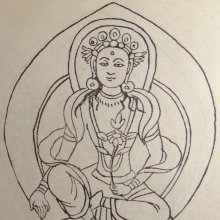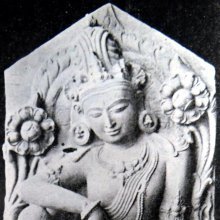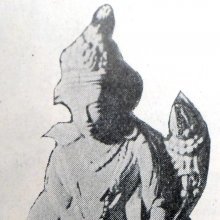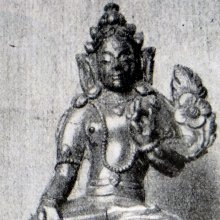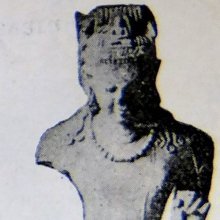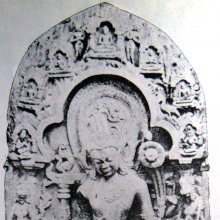Lokanatha, Loka-natha, Lokanāthā, Lokanātha: 22 definitions
Introduction:
Lokanatha means something in Buddhism, Pali, Hinduism, Sanskrit, Marathi. If you want to know the exact meaning, history, etymology or English translation of this term then check out the descriptions on this page. Add your comment or reference to a book if you want to contribute to this summary article.
Images (photo gallery)
(+2 more images available)
In Hinduism
Pancaratra (worship of Nārāyaṇa)
Source: archive.org: Isvara Samhita Vol 1Lokanātha (लोकनाथ) refers to one of the various Vibhava manifestations according to the Īśvarasaṃhitā 24.300-302.—Accordingly, “who has wide eyes is saluted by all gods, occupies a good throne and has the eyes closed in meditation. He is seated on a lotus (or in the padmāsana posture), is of a complexion comparable to the inferior of the lotus and has his intellect filled with sympathy. His hands bear the (marks of) conch and lotus. He proclaims (shows) the three courses of knowledge, detachment and good dharma”
These Vibhavas (e.g., Lokanātha) represent the third of the five-fold manifestation of the Supreme Consciousness the Pāñcarātrins believe in.

Pancaratra (पाञ्चरात्र, pāñcarātra) represents a tradition of Hinduism where Narayana is revered and worshipped. Closeley related to Vaishnavism, the Pancaratra literature includes various Agamas and tantras incorporating many Vaishnava philosophies.
Ayurveda (science of life)
Rasashastra (Alchemy and Herbo-Mineral preparations)
Source: Wisdom Library: Rasa-śāstraLokanātha (लोकनाथ) or Lokanātharasa is the name of an Ayurvedic recipe defined in the fourth volume of the Rasajalanidhi (chapter 7, enlargement of spleen [plīhodara] and liver [yakṛdudara]). These remedies are classified as Iatrochemistry and form part of the ancient Indian science known as Rasaśāstra (medical alchemy). However, since it is an ayurveda treatment it should be taken with caution and in accordance with rules laid down in the texts.
Accordingly, when using such recipes (e.g., lokanātha-rasa): “the minerals (uparasa), poisons (viṣa), and other drugs (except herbs), referred to as ingredients of medicines, are to be duly purified and incinerated, as the case may be, in accordance with the processes laid out in the texts.” (see introduction to Iatro chemical medicines)

Āyurveda (आयुर्वेद, ayurveda) is a branch of Indian science dealing with medicine, herbalism, taxology, anatomy, surgery, alchemy and related topics. Traditional practice of Āyurveda in ancient India dates back to at least the first millenium BC. Literature is commonly written in Sanskrit using various poetic metres.
Purana and Itihasa (epic history)
Source: archive.org: Shiva Purana - English TranslationLokanātha (लोकनाथ) refers to “one who is the lord of the worlds” and is used to describe Śiva, according to the Śivapurāṇa 2.3.11.—Accordingly, as Himavat (Himālaya) eulogised Śiva: “O great god, lord of the gods, O lord Śiva, the three worlds are sustained by you alone who are lord of the worlds [i.e., lokanātha]. Obeisance to Thee, O lord of gods, obeisance to the one who has assumed the form of a Yogin, obeisance to Thee that art possessed and devoid of attributes and obeisance to Thee who art sportive. [...]”.

The Purana (पुराण, purāṇas) refers to Sanskrit literature preserving ancient India’s vast cultural history, including historical legends, religious ceremonies, various arts and sciences. The eighteen mahapuranas total over 400,000 shlokas (metrical couplets) and date to at least several centuries BCE.
In Buddhism
Theravada (major branch of Buddhism)
Source: Pali Kanon: Pali Proper NamesOne of the five daughters of Vijayabahu I. and Tilokasundari. She married Kittisirimegha. Cv.lix.31, 44.
Theravāda is a major branch of Buddhism having the the Pali canon (tipitaka) as their canonical literature, which includes the vinaya-pitaka (monastic rules), the sutta-pitaka (Buddhist sermons) and the abhidhamma-pitaka (philosophy and psychology).
Mahayana (major branch of Buddhism)
Source: Wisdom Library: Maha Prajnaparamita SastraLokanātha (लोकनाथ) is a synonym for the Buddha according to the 2nd century Mahāprajñāpāramitāśāstra (chapter IV). Lou kia na t’a (Lokanātha) in the language of Ts’in means “protector of the world”.
Source: academia.edu: A Study and Translation of the GaganagañjaparipṛcchāLokanātha (लोकनाथ) refers to the “protector of the world”, according to the Gaganagañjaparipṛcchā: the eighth chapter of the Mahāsaṃnipāta (a collection of Mahāyāna Buddhist Sūtras).—Accordingly: “[...] The Bodhisattva Dharmarāja and the whole congregation, having joined the palms of their hands, paid homage to open space, and sat down. Then, by the magical presence of the Bodhisattva Gaganagañja, these verses resonated in open space: ‘[...] (142) Just as the open space cannot be filled up with even all beings, so the series of thoughts also cannot be filled up with all objects of sense. (143) The great words with the lion’s roar, the words given by the protector of the world (lokanātha), and the supermundane insight, you should find satisfaction in these teachings. [...]’”.

Mahayana (महायान, mahāyāna) is a major branch of Buddhism focusing on the path of a Bodhisattva (spiritual aspirants/ enlightened beings). Extant literature is vast and primarely composed in the Sanskrit language. There are many sūtras of which some of the earliest are the various Prajñāpāramitā sūtras.
Tibetan Buddhism (Vajrayana or tantric Buddhism)
Source: Wisdom Library: Tibetan BuddhismLokanātha (लोकनाथ) is the name of a Bodhisattva mentioned as attending the teachings in the 6th century Mañjuśrīmūlakalpa: one of the largest Kriyā Tantras devoted to Mañjuśrī (the Bodhisattva of wisdom) representing an encyclopedia of knowledge primarily concerned with ritualistic elements in Buddhism. The teachings in this text originate from Mañjuśrī and were taught to and by Buddha Śākyamuni in the presence of a large audience (including Lokanātha).
Source: archive.org: The Indian Buddhist IconographyLokanātha (लोकनाथ) or Lokanāthalokeśvara refers to one of the various forms of Avalokiteśvara having their Sādhana described in the 5th-century Sādhanamālā (a collection of sādhana texts that contain detailed instructions for rituals).—His Colour is white; his Symbol is the lotus; his Mudrā is the varada.—Four Sādhanas are devoted to the worship of the Lokanātha form of Avalokiteśvara. He is single in three Sādhanas and only one Sādhana describes him as accompanied by Tārā and Hayagrīva.
The Dhyāna (meditation instructions) of Lokanātha is described in the Sādhanamālā as follows:
“Following the same procedure as before, the worshipper should think himself as Lokanātha, resplendent like the moon, as springing from the sacred syllable Hrīḥ and wearing the jaṭāmukuṭa. He has within his matted hair the figure of the god, Vajradharma, is the destroyer of all diseases, exhibits the varada-mudrā in the right hand and carries the lotus in the left. He sits in the lalita attitude, is peaceful and resplendent. To his right is Tārā, who has a peaceful appearance, exhibits the varada-mudrā and carries the lotus. To the left is Hayagrīva, who displays the gesture of bowing and carries the staff in his two hands. He is red in colour, appears terrible and is clad in the garment of tiger-skin”.
Later, the Sādhana adds an account of the deities constituting the Lokanātha-maṇḍala:—
Source: academia.edu: The Structure and Meanings of the Heruka Maṇḍala“On the eight petals of the lotus [on which the god sits] should be placed the gods Maitreya and others. Maitreya is yellow in colourcarries the Nāga [keśara] flower and exhibits the varada pose. Kṣitigarbha is of green colour, carries the Kalaśa and exhibits the abhaya pose. Vajrapāṇi is whitish in colour, carries the vajra and exhibits the abhaya-mudrā. Khagarbha has the colour of the blue sky, carries the Cintāmaṇi and exhibits the varada-mudrā . Mañjughoṣa is of golden complexion and carries in his two hands the sword and the book. Gaganagañja is of red colour, carries the lotus and exhibits the varada-mudrā. Viṣkambhin is ash-coloured, carries the excellent jewel and exhibits the varada-mudrā. Samantabhadra is yellowish in complexion, carries the jewel on a lotus and exhibits the varada-mudrā. The four goddesses Dhūpā and others (accompany Lokanātha) and the (four goddesses) Vajrāṅkuśī and others guard the gates, their colour and weapons being in accordance with the canons the Maṇḍala. In this way Lokanātha should be meditated upon by the worshipper”.
Lokanātha (लोकनाथ) is the name of a Vīra (hero) who, together with the Ḍākinī named Lokanāthī forms one of the 36 pairs situated in the Hṛdayacakra, according to the 10th century Ḍākārṇava chapter 15. Accordingly, the hṛdayacakra refers to one of the four divisions of the sahaja-puṭa (‘innate layer’), situated within the padma (lotus) in the middle of the Herukamaṇḍala. The 36 pairs of Ḍākinīs and Vīras [viz., Lokanātha] are reddish yellow in color; they each have one face and four arms; they hold a skull bowl, a skull staff, a small drum, and a knife.

Tibetan Buddhism includes schools such as Nyingma, Kadampa, Kagyu and Gelug. Their primary canon of literature is divided in two broad categories: The Kangyur, which consists of Buddha’s words, and the Tengyur, which includes commentaries from various sources. Esotericism and tantra techniques (vajrayāna) are collected indepently.
Languages of India and abroad
Pali-English dictionary
Source: BuddhaSasana: Concise Pali-English Dictionarylokanātha : (m.) the lord of the world.
Source: Sutta: The Pali Text Society's Pali-English DictionaryLokanātha refers to: saviour of the world, Ep. of the Buddha Sn. 995; Vism. 201, 234; VvA. 165; PvA. 42, 287.
Note: lokanātha is a Pali compound consisting of the words loka and nātha.

Pali is the language of the Tipiṭaka, which is the sacred canon of Theravāda Buddhism and contains much of the Buddha’s speech. Closeley related to Sanskrit, both languages are used interchangeably between religions.
Marathi-English dictionary
Source: DDSA: The Molesworth Marathi and English Dictionarylōkanātha (लोकनाथ).—m (S) A particular medicinal preparation. 2 (Lord of the people.) A term for God or for a king.
Marathi is an Indo-European language having over 70 million native speakers people in (predominantly) Maharashtra India. Marathi, like many other Indo-Aryan languages, evolved from early forms of Prakrit, which itself is a subset of Sanskrit, one of the most ancient languages of the world.
Sanskrit dictionary
Source: DDSA: The practical Sanskrit-English dictionaryLokanātha (लोकनाथ).—
1) Brahman.
2) Viṣṇu.
3) Śiva.
4) a king, sovereign.
5) a Buddha
6) the sun.
Derivable forms: lokanāthaḥ (लोकनाथः).
Lokanātha is a Sanskrit compound consisting of the terms loka and nātha (नाथ).
Source: Cologne Digital Sanskrit Dictionaries: Edgerton Buddhist Hybrid Sanskrit DictionaryLokanātha (लोकनाथ).—frequent as epithet of the historic Buddha, as in Pali, e.g. Lalitavistara 97.16; in Sādhanamālā (29.17 etc.) n. or epithet of a Buddha; it is not clear that Śākyamuni is meant, tho he may be.
Source: Cologne Digital Sanskrit Dictionaries: Shabda-Sagara Sanskrit-English DictionaryLokanātha (लोकनाथ).—m.
(-thaḥ) 1. A sovereign of the universe. 2. One of the Jaina or Bauddh'ha saints. E. loka the world, nātha lord.
Source: Cologne Digital Sanskrit Dictionaries: Cappeller Sanskrit-English DictionaryLokanātha (लोकनाथ).—[masculine] lord of the worlds (Brahman, Viṣṇu, or Śiva); also ruler of men, king.
Source: Cologne Digital Sanskrit Dictionaries: Aufrecht Catalogus Catalogorum1) Lokanātha (लोकनाथ) as mentioned in Aufrecht’s Catalogus Catalogorum:—Advaitamuktāsāra.
2) Lokanātha (लोकनाथ):—Mallaprakāśa med.
3) Lokanātha (लोकनाथ):—Lokabhāskara jy.
4) Lokanātha (लोकनाथ):—Kṛtyaratnākara.
5) Lokanātha (लोकनाथ):—son of Vaidyanātha: Prāyaścittadīpikā.
Source: Cologne Digital Sanskrit Dictionaries: Monier-Williams Sanskrit-English Dictionary1) Lokanātha (लोकनाथ):—[=loka-nātha] [from loka > lok] m. ‘lord of worlds’, Name of Brahmā, [Catalogue(s)]
2) [v.s. ...] of Viṣṇu-Kṛṣṇa, [Mahābhārata; Bhāgavata-purāṇa]
3) [v.s. ...] of Śiva, [Kumāra-sambhava]
4) [v.s. ...] of the gods in general, [Bhāgavata-purāṇa]
5) [v.s. ...] of the sun, [Catalogue(s)]
6) [v.s. ...] a protector or guardian of the people, king, sovereign, [Rāmāyaṇa; Bhāgavata-purāṇa] etc.
7) [v.s. ...] a Buddha, [cf. Lexicographers, esp. such as amarasiṃha, halāyudha, hemacandra, etc.]
8) [v.s. ...] Name of a Buddha, [Rājataraṅgiṇī]
9) [v.s. ...] of Avalokiteśvara, [ib.; Inscriptions]
10) [v.s. ...] of various authors, [Catalogue(s)]
11) [v.s. ...] a panic. mixture, [Rasendracintāmaṇi]
12) [v.s. ...] mfn. being under the guardianship of mankind, [Kāvya literature]
Source: Cologne Digital Sanskrit Dictionaries: Yates Sanskrit-English DictionaryLokanātha (लोकनाथ):—[loka-nātha] (thaḥ) 1. m. A sovereign.
[Sanskrit to German]
Sanskrit, also spelled संस्कृतम् (saṃskṛtam), is an ancient language of India commonly seen as the grandmother of the Indo-European language family (even English!). Closely allied with Prakrit and Pali, Sanskrit is more exhaustive in both grammar and terms and has the most extensive collection of literature in the world, greatly surpassing its sister-languages Greek and Latin.
Kannada-English dictionary
Source: Alar: Kannada-English corpusLōkanātha (ಲೋಕನಾಥ):—
1) [noun] the lord of all the worlds; the Supreme Being.
2) [noun] the Buddha, the founder of Buddhism.
3) [noun] the lord of a nation or country; a king.
Kannada is a Dravidian language (as opposed to the Indo-European language family) mainly spoken in the southwestern region of India.
See also (Relevant definitions)
Starts with: Lokanatha bhatta, Lokanatha cakravartin, Lokanatha sharman, Lokanathabhatta, Lokanathacakravartin, Lokanathalokeshvara, Lokanathani, Lokanatharasa, Lokanathasharman, Lokanathavyakarana.
Ends with: Adhilokanatha, Golokanatha, Suralokanatha, Trilokanatha.
Full-text (+31): Lokapati, Adhilokanatha, Lokanatharasa, Lokanathasharman, Lokanathabhatta, Lokanathacakravartin, Suralokanatha, Lokapalaka, Lokanayaka, Lokarakshaka, Padamanjari, Manohara, Trilokanatha, Kannankuti, Lokapala, Advaitamuktasara, Lokanatha sharman, Lokanatha bhatta, Lokanatha cakravartin, Krishnabhyudaya.
Relevant text
Search found 31 books and stories containing Lokanatha, Loka-natha, Lokanāthā, Lokanātha, Lōkanātha, Loka-nātha, Lōka-nātha, Loka-nāthā; (plurals include: Lokanathas, nathas, Lokanāthās, Lokanāthas, Lōkanāthas, nāthas, nāthās). You can also click to the full overview containing English textual excerpts. Below are direct links for the most relevant articles:
Chaitanya Bhagavata (by Bhumipati Dāsa)
Verse 2.25.1 < [Chapter 25 - The Discourse on Spiritual Knowledge by Śrīvāsa’s Dead Son]
Verse 2.23.415 < [Chapter 23 - Wandering about Navadvīpa On the Day the Lord Delivered the Kazi]
Verse 2.28.151 < [Chapter 28 - The Lord’s Pastime of Accepting Sannyāsa]
The Indian Buddhist Iconography (by Benoytosh Bhattachacharyya)
Figure 105-108 - (Avalokiteśvara): Lokanātha
108 forms of Avalokiteśvara (18): Lokanātha Raktāryāvalokiteśvara
Vietnamese Buddhist Art (by Nguyen Ngoc Vinh)
1. Physical appearance of Avalokitesvara < [Chapter 3 - Unifying factors of the Avalokitesvara Images in South Vietnam and South East Asia]
2. Avalokitesvara images in Champa < [Chapter 3 - Unifying factors of the Avalokitesvara Images in South Vietnam and South East Asia]
Rasa Jala Nidhi, vol 4: Iatrochemistry (by Bhudeb Mookerjee)
Part 10 - Treatment for enlargement of spleen and liver (9): Lokanatha rasa < [Chapter VII - Enlargement of spleen (plihodara) and liver (yakridudara)]
Jainism in Odisha (Orissa) (by Ashis Ranjan Sahoo)
Jaina Antiquities at Manapur-Gadhama < [Chapter 3: Survey of Jaina Antiquities in Odisha]
Jaina Antiquities in Jagatsinghpur District (Introduction) < [Chapter 3: Survey of Jaina Antiquities in Odisha]
Shrimad Bhagavad-gita (by Narayana Gosvami)
A Brief Life Sketch of Śrīla Viśvanātha Cakravartī Thākura < [Introduction (to the Hindi edition)]
